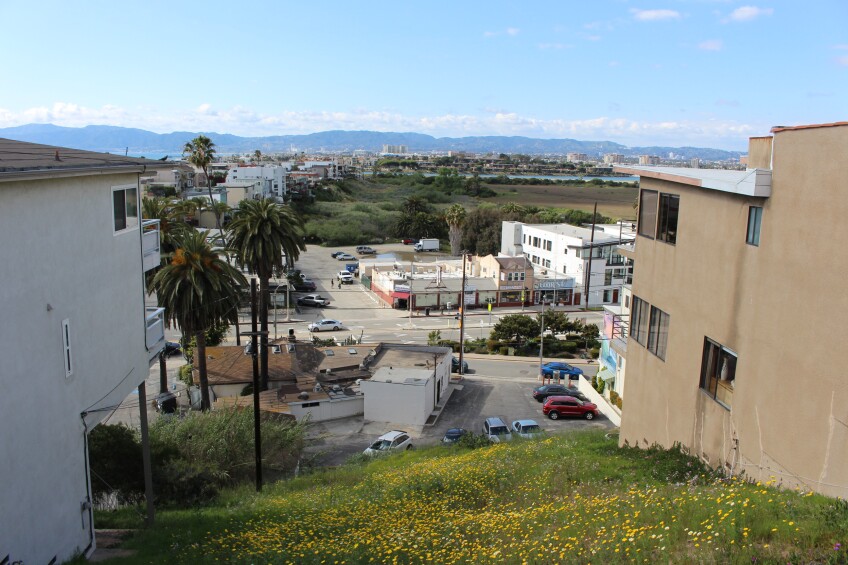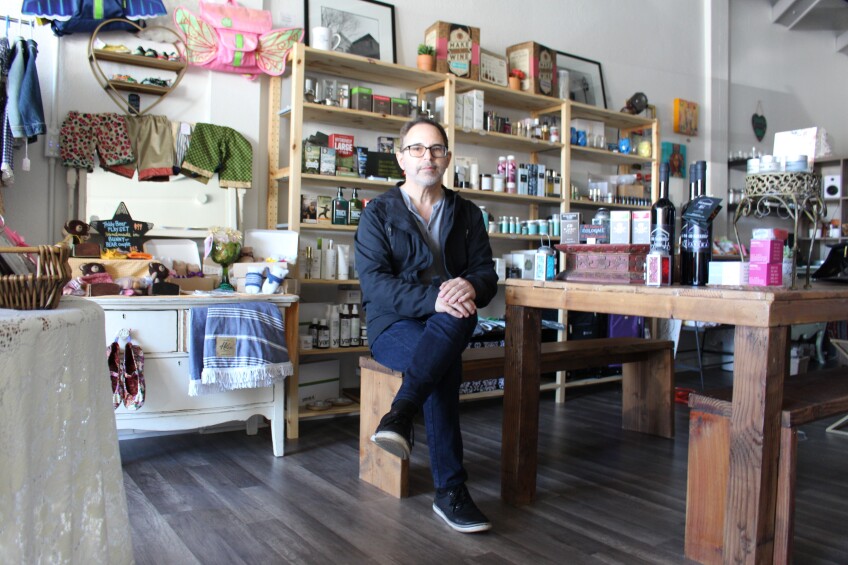Culver Boulevard Business Owners Wait, Hope to Keep Their Playa del Rey Beach Town Alive

Part of a SoCal Connected occasional series checking on the COVID-19 shutdown’s effect on business owners.
Culver Boulevard in Playa del Rey, where the city meets the sand, could be Main Street in Anywhere USA.
The tiny beach town’s main drag is dotted with small businesses whose owners are on a first-name basis with customers. There’s the flower shop, the dog groomer, a barber shop, the candle store and a collection of bars and restaurants, many of which have been in the beach enclave for as many as 60 years.
One of them is the Harbor Room. With just seven stools, it’s reportedly the smallest bar in Los Angeles County and the third smallest in America. It sits empty now, along with just about everything else on Culver Boulevard since the COVID-19 shutdown began.
“We are down 98% and I know the restaurants are hurting too,” said Lance Williams, the 55-year-old owner of Playa Del Rey Florist. “Food is a little more of a necessity than flowers.”
Normally travelled daily by commuters heading through Playa Vista to the South Bay beach cities, Culver Boulevard is in danger, the same experienced in business districts across Southern California and the United States.
Shutting down suddenly March 16 derailed business owners already living life on the edge, working monthly to make their rent, pay their home mortgages and car loans, and keep their creditors from calling.
Still recovering from losses suffered when city officials restriped Culver, Vista del Mar and Jefferson Boulevard in 2017, business owners are desperately waiting for government financial assistance, wondering if it will ever come, and questioning whether they will ever be right enough again to pay it back.
Jim Iacono, owner of Vavera, a unique gift shop that sells luxury candles, art, mystic stones and heating oils, paid half his rent that was due April 1. He has no idea what he will do when May arrives.
Iacono, who spoke to SoCal Connected last month when his business closed and his April rent became due, laughed Friday at his predicament, explaining how an online application for government assistance through the CARES Act was lost, and how he dangled on hold for hours trying to get someone to help him.
“What am I going to do, punch the window?” he said. “It’s just a comedy of ineffectiveness…We are supposed to be getting relief, but nothing materialized.”

Iacono applied for a Paycheck Protection Program loan, only to be told no one could find what he filed when the website changed its look when the Senate passed the measure. Iacono said he was told to apply for the loan through Wells Fargo’s website and, when he did, the government announced the $394 billion set aside for forgivable loans to small business owners to meet payroll had run out.
“And then I hear from people who got money,” Iacono said. “I don’t understand how they did it.”
At Cantalini’s Salerno Beach Restaurant, business – now takeout and pickup under the rules – is down 80 percent. Owner Lisa Schwab, who lost $450,000 in business during the road restriping debacle, has furloughed eight bussers who have filed for unemployment benefits, but is continuing to pay seven members of her workforce. Schwab, who already had a vibrant takeout business, said she is thankful for the customers sticking with her. She managed to pay her April rent, but has payroll and sales taxes due April 30. And then comes May.
“Of course, we don’t have enough revenue coming in to deal with all of our obligations,” Schwab said. “We did our best to keep paychecks flowing…There are a lot of people really, really struggling. That’s the part that really hurts me.”
Losing much of his Valentine’s Day take to burglars who escaped with cash, two delivery vans and flowers Feb. 16, Williams had about $4,000 in flowers in his refrigerators when the stay-at-home order shut him down March 16. Some went to friends and to nursing homes, but much of it died.


Williams said he tried to keep his shop open with no-contact deliveries, but the Los Angeles flower market also closed, cutting off his supply. Twice a week, he’s driven to Carpenteria to buy flowers directly from farmers, but suspects he’s spent more on travel and flowers than he’s taken in from customers.
“We are having a really hard time,” Williams said. “A lot of people don’t know we’re open. We’re just answering the phones a few hours a day. It’s kind of tough to keep a flow going.”
Williams applied for a PPP loan, and was told to file more documents. He paid some of his April rent and expenses but is dreading May.
“I’m kind of going back and forth with the landlord right now,” he said.
Iacono’s landlord gave him the deal to pay just half his rent April 1, but he owes the rest. He wants to talk to her again to negotiate for May, but she has not responded. He senses that means she expects the full amount.
“We are closed. What am I going to do? Dig into my 401K to pay the rent for my business?” Iacono said. “I don’t want to be a deadbeat tenant, but what am I supposed to do?”

Even if Iacono does put off his rent, eventually he must fulfill the obligation. And the Small Business Association loans being offered also have to be paid back.
“I already have enough debt,” Iacono said. “I don’t need more debt.”
Williams said he has put off his mortgage and car payment for 90 days but – like Iacono – knows he’ll eventually have to pay up. He lost Easter sales, and soon will lose two of his biggest days of the year -- Administrative Professionals' Day on April 22, and Mother’s Day May 10.
At some point soon, Williams said, businesses must be allowed to operate on a limited basis, where workers and customers wear masks and gloves, and everyone continues social distancing. In the meantime, he said he is trying to remain positive and, starting next week, will take to his phones and call customers, trying to let them know he can make deliveries.
“I am hoping the sooner we get open, the sooner we can get back in the swing of life,” he said.
Schwab, meanwhile, is trying to feed her customers and keep her employees fed. She said she is “paying the things we have to pay,” negotiating prices with vendors, and considering reducing her menu offerings. She recently paid a Wilshire Boulevard pharmacist $500 for a box of masks.
As an owner, I’m the last to be paid,” she said. “I have a mortgage and I have bills. I am just doing my best. It’s only a month. When we get to two, three months, it’s certainly going to have an impact. Nobody really knows if, when or ever we will be in full operation.”
But, Schwab said, she also is trying to stay positive. She is thankful for her customers, grateful to those who have tipped employees from $20 to $100.
“I am so touched by what I’m seeing,” she said. “I can’t really in all fairness complain. I feel blessed. I feel loved. I feel our community coming forward and unifying.”





